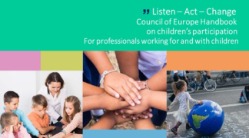The Council of Europe has recently launched a new participation handbook to support professionals working for and with children.
The aim is to guide implementation of the Council's recommendations on the participation of the child and young people under 18 in decison-making and Article 12 of the UN Convention on the Rights of the Child [1].
 The "Listen – Act – Change"’ handbook combines different modules to explain the concept of child participation in theory and practice, and to guide professionals towards its implementation in different settings – individually, collectively and in specific institutional contexts.
The "Listen – Act – Change"’ handbook combines different modules to explain the concept of child participation in theory and practice, and to guide professionals towards its implementation in different settings – individually, collectively and in specific institutional contexts.
The handbook has a number of child participation examples including the work of Roscommon Children and Young People’s Services Committee (CYPSC) consulting with very young children regarding their health and wellbeing.
European partners noted the strong mandate in Ireland for children’s participation in decision-making.
A recent webinar, held by the Council of Europe to launch the handbook, featured a number of speakers including Tusla’s Roscommon CYPSC Co-ordinator, Caroline Duignan and Researcher Marie Gibbons. Following their presentation European partners noted the strong mandate in Ireland for children’s participation in decision-making throughout our systems; from service delivery agencies to Government.
CYPSC are delighted that the work of Roscommon CYPSC has been featured at European level in the new handbook and wish to congratulate our colleagues for their excellent presentation and congratulations too to all CYPSC partners in Roscommon for their work.
You can visit the Council of Europe website here to find out more about "Listen-Act-Change."
To find out more about Roscommon's work with very young children Click Here.
To read more about Roscommon CYPSC Click Here.
To read more CYPSC news Click Here.
[1] Convention on the Rights of the Child
Article 12
1. States Parties shall assure to the child who is capable of forming his or her own views the right to express those views freely in all matters affecting the child, the views of the child being given due weight in accordance with the age and maturity of the child.
2. For this purpose, the child shall in particular be provided the opportunity to be heard in any judicial and administrative proceedings affecting the child, either directly, or through a representative or an appropriate body, in a manner consistent with the procedural rules of national law.